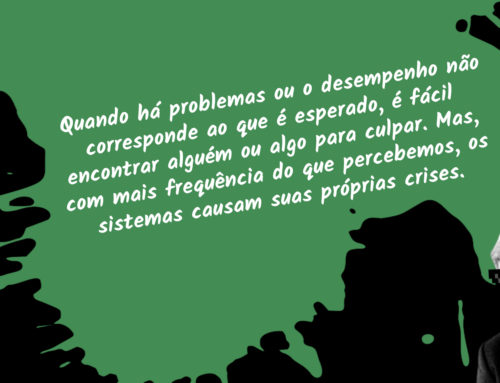A few days ago, on a discussion channel on Target Teal’s Slack, I posted a reflection on the phenomenon I called “WE-Have-To“. I’m currently living it at eduK, a self-managed Brazilian startup that I work with, and dedicated to supporting people who want to work on their own, living from their passions.
During that night, after some discussions during my “Reinventing HR” class in Rio, I kept thinking about the critical, enabling role that “self-accountability” plays in self-management and self-organization of groups.
“WE-Have-To” is an anti-pattern that is the opposite of that. It is characterized by the use of an indefinite subject together with a demand veiled by a behavior that is also unclear. It’s more than just a way of expressing yourself, it’s a way of perceiving things. A way of thinking that creates certain behaviors. When I don’t take responsibility for what I feel, what I need or what I choose to do, I become oblivious to myself. I don’t understand how I contribute to the situation I’m complaining about. Almost as if it’s possible not to be part of what happens to me. “I hate bigoted jokes” (but I laugh out of politeness). “People keep telling me what I should do” (and I comply because I don’t want to argue). “I think what’s happening is horrible” (and I keep silent so as not to expose myself).
Here comes the anti-pattern. When I notice that something disturbs me, I immediately propose that WE do something. We, you, they… Whatever. It doesn’t even have to be clear, it just matters to be in the plural. A silent, generic demand that when echoed creates a social pressure that seems to come from nowhere. It might seem to legitimize me, make me more secure, make everything more relevant. #ButNot. “We should take better care of people”. “We shouldn’t have done that”. “We need to tell some truths around here”. “Someone has to sort this out”. “You have to change the way you work”. “Politicians shouldn’t be corrupt”. “They should respect us more”. The truth is that these lines only dilute responsibility. They don’t generate commitment. They inhibit action.
I don’t call this “victimization”. This is a derogatory term and not very precise in relation to the phenomenon I’m talking about. In these cases, I don’t see myself as a victim, even though I see myself as an inactive part of what’s happening. When I see it that way, I find myself unable to do anything about it. This is not lack of maturity either. It’s not laziness to think. It’s not self-indulgence. Nobody wakes up in the morning and thinks “I’ll excuse myself from everything today”. It is a fragmented perception of reality. A belief that people and events are independent and unrelated.
I’ve been told that there is also the opposite situation. People who think they are responsible for everything and everyone. Is this really the opposite? When I don’t recognize that responsibility is more “how I choose to participate in something” than something that is assumed or transferred, then it’s equally possible that I consider having all or no responsibility for what happens.
“WE-Have-To” is an attempt to escape. An escape from being part of what happens. An impossible escape because when I realize something, I’m already part of it. And taking on this part is precisely what makes it possible to do something different.
It seems to me that there is a tacit and dysfunctional logic through which I watch people try to take care of their tensions that bothers me deeply. I even believe that the path of self-management presupposes an explicit logic opposite to this one, which is extremely difficult for all of us to assimilate in some situations.
I-SOMEONE Logic: “I want something I don’t have right now; therefore, SOMEONE must do something so I get it.”
I-I Logic: “I want something I don’t have right now; therefore I mobilize myself and others so I get it.”
If you’ve come this far thinking “it’s true, people do this a lot”, you don’t get my point. Go back 5 spaces and start again. The text is about you who, like me, generalizes or speaks from outside the problem. I leave an invitation. How about replacing “WE-Have-to” with “I-Need-That” or “I-Hope-That” maybe along with “I-am-Willing-To”? Try this for just one day. If it’s too difficult, try for a shorter time or at least during a conversation. It will be enlightening to say the least! ;-)
Translated by Tanya Stergiou






Leave A Comment